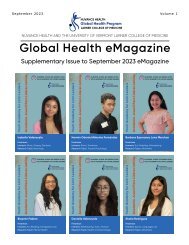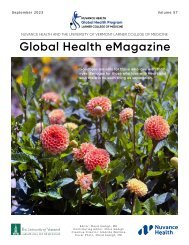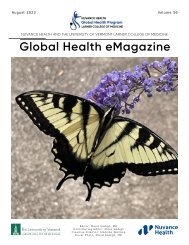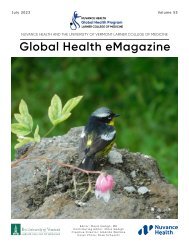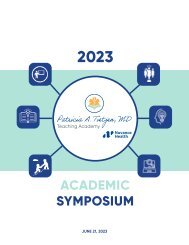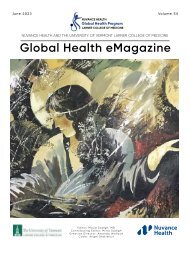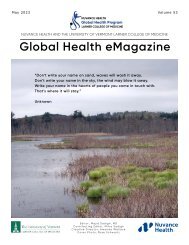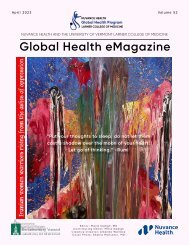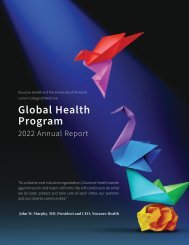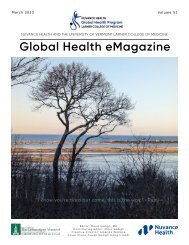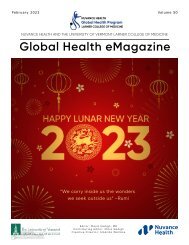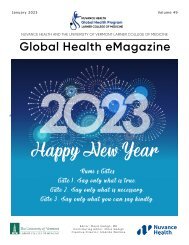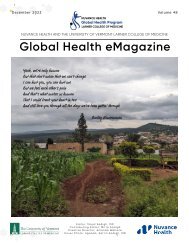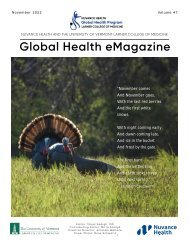climbforacause2019_rev
You also want an ePaper? Increase the reach of your titles
YUMPU automatically turns print PDFs into web optimized ePapers that Google loves.
How do you manage to care for people around the world and in Connecticut?<br />
My work with the Global Health Program is founded on the concept of global relatedness<br />
- that we are all connected, whether in Connecticut, East Africa, Southeast Asia, or central<br />
America. Trusting friendships allows for a continual exchange of culture, knowledge, ideas,<br />
skills, and worldviews between our home institutions in Connecticut and Vermont and our<br />
international partners around the world in Botswana, China, the Dominican Republic, India,<br />
Thailand, Russia, Uganda, Vietnam, and Zimbabwe. We are currently moving toward internetworking<br />
among our global health sites around the world, led by the principle that we<br />
can augment our impact and effectiveness as a unified force. With the belief that we are all<br />
connected, caring for people around the world and in Connecticut comes naturally, as we all<br />
live on the same planet and share the same air.<br />
What is the value of a global health nursing program and how will it impact people?<br />
Nurses are crucial to healthcare delivery in all arenas, with their dedication to health often<br />
extending well beyond the immediate community in which they serve. My experience in Liberia<br />
during the 2014 Ebola epidemic showed me firsthand the incredible talent, skills, and essential<br />
role that nurses play. In contrast with doctors who often have disjointed relationships with<br />
patients in the hospital, nurses have a greater continuity of care that allows them to better<br />
understand and connect with patients. They perform a myriad of tasks, often serving as the<br />
primary patient advocate and voice as well as the caregiver and attendant of patient/family<br />
strife and vulnerability. They also often run hospitals and clinics in resource-limited settings.<br />
With 1:12 ratio of physicians to nurses and other healthcare workers in Subsaharan Africa,<br />
physicians comprise only a miniscule portion of global health personnel. Thus, capacity building<br />
of nurses, nurse assistants, and other healthcare providers is critical to any healthcare setting.<br />
To cite an example, the African Community Center for Social Sustainability, one of our partners<br />
in rural Uganda, recently opened a new nursing school with an overwhelming number of its<br />
students orphaned and coming from underserved communities. Impacting their education will<br />
substantially impact patient care and family wellness in their communities, as they are the<br />
driving force of the healthcare system. By building a global health nursing program, nurses<br />
can further build on their skills and competencies while bringing their sense of generosity and<br />
advocacy to play in the larger, united global health arena.<br />
What was it like having your daughters with you on this latest hike?<br />
Having my daughters with me on this climb meant that I was more careful as a father, an<br />
experienced Kilimanjaro climber, and doctor who knows about potential illnesses on the<br />
mountain. Though our guides are incredibly knowledgeable and reliable, I couldn't help but be<br />
concerned about Katrin’s Reynaud’s condition and Mitra’s history of mountain sickness. I was<br />
grateful for the quality time we were able to spend together, experiencing the mountain while<br />
learning new things about each other. It is a truly unique experience to share together as a<br />
family.<br />
66




